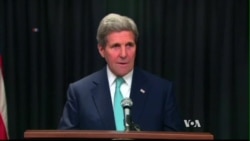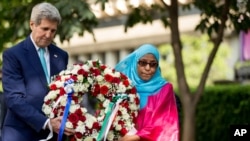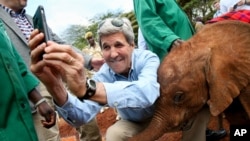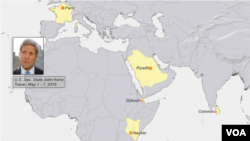U.S. Secretary of State John Kerry has announced millions of dollars in new aid for Africa at a Monday news conference in Nairobi, Kenya.
Kerry said $45 million in additional funding will be provided to help the UNHCR provide better school, health clinics and clean drinking water to refugees.
The State Department said the funds will help 600,000 refugees living in Kenya, including 400,000 people from Somalia and 45,000 refugees from South Sudan.
It said that including the just announced funding, the United States has provided since 2014 more than $289 million in humanitarian assistance for Kenya.
Honoring terror victims
Kerry also offered condolences to the families and victims of the Garissa University attack. He said such attacks cause turmoil and chaos, but "in the end, instead of dividing us, they bring us closer together."
Earlier in the day, Kerry honored the victims of the 1998 bombing of the U.S. Embassy in Nairobi and a series of more recent attacks as he pledged Monday that the U.S. will continue supporting the fight against terrorism.
Kerry took part in a wreath-laying ceremony at a memorial at the site where the embassy bombing took place, saying "terrorists will always fail" in efforts to instill fear and divide people and that "the future does not belong to them."
"Yes, they can reduce a building to rubble," Kerry said. "And yes, they can even deprive innocent people of their lives, but they do not give anyone anything of what really makes life worthwhile."
The attack at the embassy in Kenya and one carried out at the U.S. Embassy in Dar es Salaam, Tanzania, were a "wake-up call" for the United States, said Peter Pham, the director of the Atlantic Council's Africa Center.
"A call for a course of correction on our perception of Africa," said Pham.
He said the attacks prompted the U.S. government to take a closer look at its engagement in East Africa.
"They came less than two years after a Department of Defense document on U.S. strategy in sub-Saharan Africa declared, amazingly, for those of us who know, love and work on Africa, that in the eyes of the planners who wrote that document, that Africa had and I quote 'little strategic value for the United States,' " said Pham.
Meeting with Kenyatta
Kerry also met Monday with Kenyan President Uhuru Kenyatta to discuss ways to more effectively deal with threats posed by the militant group al-Shabab.
The visit comes at a time of heightened concern about attacks in neighboring countries carried out by al-Shabab, the al-Qaida-linked militant group based in Somalia.
The militants have targeted Kenya in multiple attacks, including the 2013 siege of the Westgate mall in Nairobi and last month's assault on Garissa University. The group has linked the attacks to Kenya's involvement in an African Union force battling the militants in Somalia.
The United States has been conducting drone strikes and providing support to African Union troops fighting al-Shabab militants. A senior State Department official said engaging with regional leaders on environmental and political conditions were also part of the U.S. strategy.
Kerry also met the country’s main opposition leaders, including former Prime Minister Raila Odinga.
Heading into his meeting with the opposition leaders, Kerry said his expectations were to listen so that he could be as informed as possible about the challenges that Kenya is facing.
One of those challenges involves refugees. Kenya is hosting about 600,000 refugees at three camps.
In a background briefing, a senior State Department official said Kerry has been urging the Kenyan government to uphold its obligations to refugees, after officials threatened to close one camp that hosts a large Somali population.
On Sunday, Kerry visited a Nairobi National Park, which included an up-close encounter with baby elephants and scenic views of wildlife.
Next stops
After visiting Kenya, Kerry travels to Djibouti, the home of a U.S. military hub for the Horn of Africa region.
He then travels to Riyadh for talks with senior leaders on regional security.
From Saudi Arabia, he heads to Paris to meet with the foreign ministers of Gulf Cooperation Council countries, participate in Victory Day commemorations and meet with French Foreign Minister Laurent Fabius.















